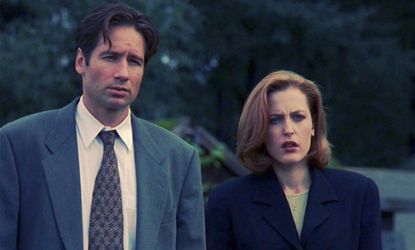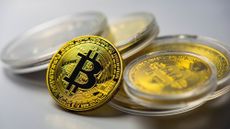Alien conspiracy theorists think the government is on the verge of spilling big secrets


For as long as I've been reading about alien conspiracies, it's been an accepted article of faith among believers that the government was the enemy of the people and was conspiring with an alien race, or simply with other governments in our world, to keep evidence of a sentient extraterrestrial presence hidden.
In 2012, authors Richard Dolan and Bryce Zabel became instant iconoclasts within the believer community when they published a book, After Disclosure, that laid out meticulously what the government should do to prepare the public for the "disclosure" of the conspiracy. The book leans in to the notion itself. The government conspirators, say these two, think that the conspiracy is untenable and that a full and open discussion of the fact of alien sentience is the best way to unite the world. Somehow.
This big secret will be revealed in 2015, if the chatter on shows like Coast-to-Coast AM is any indication. Why? Well, the "Grays" — the name given to the aliens who either conspire with the government to keep their presence hidden or are on the verge of attacking the Earth — have somehow given an ultimatum to their human co-conspirators. Maybe it's time to move humanity into the next phase of their existence. Maybe humans are battering the planet so badly that the Grays, who need the milk of the Earth to survive, are in peril. If humans fail to disclose the Grays' existence, then the Grays will make themselves known by, perhaps, a global television event that shows off their gravity-defying hardware.
Subscribe to The Week
Escape your echo chamber. Get the facts behind the news, plus analysis from multiple perspectives.

Sign up for The Week's Free Newsletters
From our morning news briefing to a weekly Good News Newsletter, get the best of The Week delivered directly to your inbox.
From our morning news briefing to a weekly Good News Newsletter, get the best of The Week delivered directly to your inbox.
One-third to half of Americans give real credence to the possibility that aliens exist and are living among us. That's 80 million to 100 million adults. They don't just think that alien DNA might have helped spark life on Earth, or that life exists elsewhere in the universe. They believe in the conspiracy. We treat them as ninnies with tin-foil hats and bumper stickers. But they are all of us!
I'm a skeptic of the Penn Jillette variety. I would not believe that a sentient alien life-form had visited the Earth even if I were to meet an alien face-to-face. I trust in my own eyes, in my own fallible, pattern-seeking brain, quite a bit less than I do the laws of science and the record of empiricism. However, humans believe in weird things for all sorts of reasons. Based on data points alone, it should be much easier to believe in the existence of ETs than it is to believe in creationism, and yet...
My interest in the UFO community is motivated by entertainment, yes, but also by professional curiosity.
The government is broadly unpopular. Americans see it lurch along, indifferent to their concerns, unable to figure out how to really enhance their lives, redistributing resources according to popular whims, too subservient to the interests that bankroll the politicians who run it. It is incapable of orchestrating major policy changes without significant hiccups. Whistle-blowers with incontrovertible evidence of government misdeed talk to The Washington Post, to Congress, or to Laura Poitras.
Sign up for Today's Best Articles in your inbox
A free daily email with the biggest news stories of the day – and the best features from TheWeek.com
UFO believers hold two opposing beliefs. One is that the government we all know is but a projected shadow on the cave. The real government, the deep state, controls the world and remains hidden. The other is that this government, all powerful and capable of keeping an alien conspiracy from coming out, is not all powerful and not capable of keeping an alien conspiracy from coming out. They've got witnesses; 500 military, intelligence, credentialed witnesses who can testify to some part of the conspiracy. (Canada's former defense minister!)
The shift from paranoia to optimism within the UFO community might represent a new strategy to gain public acceptance. UFO sightings go viral and are debunked just as quickly; perhaps, the believers believe, it's time to use the same tactics that successful political campaigns use to get the real media to pay attention, and to begin to seriously pressure political leaders to come clean. (Whether the media is part of the conspiracy itself is...well, I can't tell you.) And look: The disclosure of alien life would truly change the world overnight. Big conflicts would seem irrelevant. It would be much easier to tackle global problems if humans were forced to think of themselves as members of a single planet.
The scientists who search for extraterrestrial intelligence do not believe that aliens have visited Earth. They think that we might pick up unambiguous evidence of the existence of another civilization someday. (See the movie Contact, which was based on a book by Carl Sagan.)
Two vastly different belief architectures both agree on this: "Disclosure" or discovery would change everything. I remain skeptical. But it's fun to think about.
Marc Ambinder is TheWeek.com's editor-at-large. He is the author, with D.B. Grady, of The Command and Deep State: Inside the Government Secrecy Industry. Marc is also a contributing editor for The Atlantic and GQ. Formerly, he served as White House correspondent for National Journal, chief political consultant for CBS News, and politics editor at The Atlantic. Marc is a 2001 graduate of Harvard. He is married to Michael Park, a corporate strategy consultant, and lives in Los Angeles.
-
 The Week contest: Airport goodbyes
The Week contest: Airport goodbyesPuzzles and Quizzes
By The Week US Published
-
 'We shouldn't be surprised that crypto is back'
'We shouldn't be surprised that crypto is back'Instant Opinion Opinion, comment and editorials of the day
By Justin Klawans, The Week US Published
-
 How the national debt affects your finances
How the national debt affects your financesRachel Reeves has changed the rules, but why does that matter?
By Marc Shoffman, The Week UK Published
-
 US election: where things stand with one week to go
US election: where things stand with one week to goThe Explainer Harris' lead in the polls has been narrowing in Trump's favour, but her campaign remains 'cautiously optimistic'
By Harriet Marsden, The Week UK Published
-
 Is Trump okay?
Is Trump okay?Today's Big Question Former president's mental fitness and alleged cognitive decline firmly back in the spotlight after 'bizarre' town hall event
By Harriet Marsden, The Week UK Published
-
 The life and times of Kamala Harris
The life and times of Kamala HarrisThe Explainer The vice-president is narrowly leading the race to become the next US president. How did she get to where she is now?
By The Week UK Published
-
 Will 'weirdly civil' VP debate move dial in US election?
Will 'weirdly civil' VP debate move dial in US election?Today's Big Question 'Diametrically opposed' candidates showed 'a lot of commonality' on some issues, but offered competing visions for America's future and democracy
By Harriet Marsden, The Week UK Published
-
 1 of 6 'Trump Train' drivers liable in Biden bus blockade
1 of 6 'Trump Train' drivers liable in Biden bus blockadeSpeed Read Only one of the accused was found liable in the case concerning the deliberate slowing of a 2020 Biden campaign bus
By Peter Weber, The Week US Published
-
 How could J.D. Vance impact the special relationship?
How could J.D. Vance impact the special relationship?Today's Big Question Trump's hawkish pick for VP said UK is the first 'truly Islamist country' with a nuclear weapon
By Harriet Marsden, The Week UK Published
-
 Biden, Trump urge calm after assassination attempt
Biden, Trump urge calm after assassination attemptSpeed Reads A 20-year-old gunman grazed Trump's ear and fatally shot a rally attendee on Saturday
By Peter Weber, The Week US Published
-
 Supreme Court rejects challenge to CFPB
Supreme Court rejects challenge to CFPBSpeed Read The court rejected a conservative-backed challenge to the way the Consumer Financial Protection Bureau is funded
By Peter Weber, The Week US Published